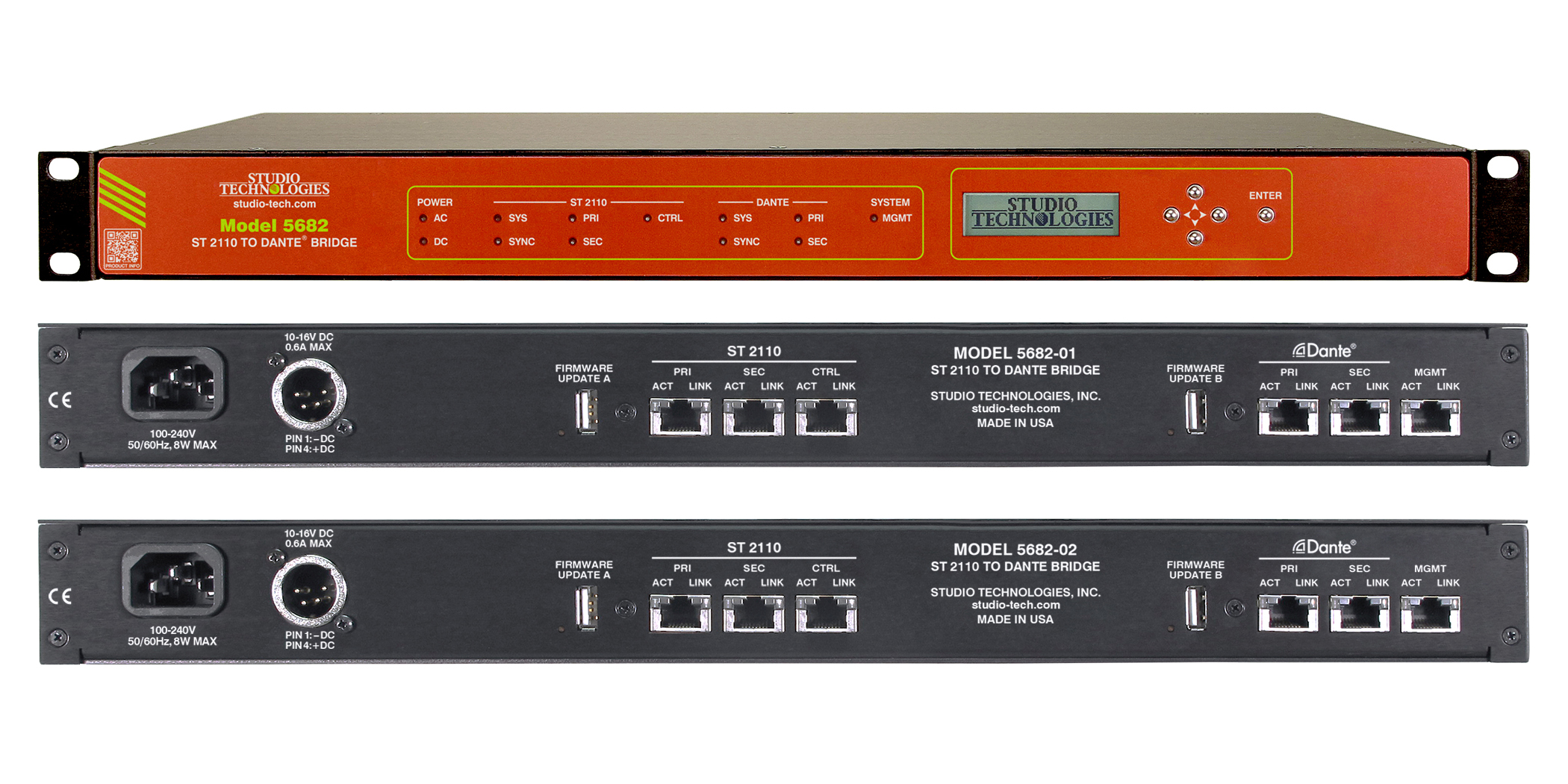Specialized Unit Allows Independent audio-Over-Ethernet Networks to be Interconnected
LAS VEGAS– Studio Technologies, manufacturer of high-quality audio, video, and fiber-optic solutions, presents its new Model 5682 ST 2110 to Dante Bridge at NAB 2024 (Booth C2346). The Model 5682 provides a high-performance means of interconnecting (“bridging”) SMPTE® ST 2110 audio channels with Dante® audio-over-Ethernet channels.

Studio Technologies’ Model 5682 ST 2110 to Dante Bridge
The Model 5682 is available in two versions: the Model 5682-01 allows up to 32 audio channels to pass in each direction, while the Model 5682-02 supports up to 64 audio channels. The unit is compatible with the SMPTE ST 2110-30 standard for PCM audio signals and the ST 2110-10 standard for signal timing. On the Dante side, the Model 5682 is compatible with the Dante Domain Manager™ (DDM) software application and is complaint with the AES67 interoperability standard.
The Model 5682’s primary application is to interconnect audio channels associated with two independent networks, one that supports ST 2110 and the other Dante. The source and destination of these audio channels would typically be other equipment such as mixing consoles, broadcast or production crosspoint switchers, matrix intercom systems, or digital audio processing units. The Model 5682 can also perform effectively on the same local area network (LAN), interconnecting independent ST 2110 and Dante audio channels. Each implementation, ST 2110 or Dante, can have its own timing (sync) reference, sample rate, and bit depth. Sample rate conversion (SRC) logic within the Model 5682 ensures that the audio signals can pass between the two implementations with minimal degradation in performance. The Model 5682’s ST 2110 and Dante network interfaces are electrically isolated and share no non-audio data, minimizing the risk of security issues. Only uncompressed PCM digital audio signals pass, by way of the SRC logic, between the two network interfaces.
“The suite of ST 2110 standards is finding wide-ranging use in broadcast applications,” says Gordon Kapes, President of Studio Technologies. “While also handling video and control signals, the Model 5682 is focused on ST 2110-compliant audio channels and their associated timing parameters. Dante audio-over-Ethernet has found acceptance in broadcast, audio/visual, and general audio applications due to its ease of use, excellent performance, strong interoperability, and wide adoption by many equipment manufacturers. As the number of facilities that utilize both ST 2110 and Dante-compliant equipment increases so does the need to interconnect them. However, interconnecting or bridging ST 2110 audio channels with Dante audio channels can present a challenge. Using the Model 5682 makes this a simple task, only requiring interconnecting standard Ethernet signals and performing a moderate amount of configuration.”
The Model 5682’s ST 2110 and Dante interfaces each incorporate three Gigabit Ethernet (GigE) connections. Two GigE ports on each interface are designated for use by the associated ST 2110 or Dante network while the third is reserved for configuration use. The ST 2110 will support redundant streams, following the SMPTE 2022-7 standard. A setting performed within the Dante Controller application selects whether the Model 5682’s Dante interface will operate in a Switched or Redundant mode.
Front-panel LED indicators, an LCD display, and five pushbutton switches are provided to view and revise selected operating parameters. NMOS, ANEMAN, and JSON configuration support for the unit’s ST 2110 interface is provided. The Dante Controller software application, available free of charge from Audinate, is used to configure the unit’s Dante network and audio parameters.
The Model 5682 can be powered by 100-240 V, 50/60 Hz or a source of 12 volts DC. Both can be simultaneously connected to provide redundant power operation. The unit’s lightweight enclosure mounts in one space (1U) of a standard 19-inch equipment rack. Industry-standard connectors are used for the Ethernet, AC mains, and DC power interconnections. The unit is built to professional standards and is intended for continuous, 24-hour operation.
